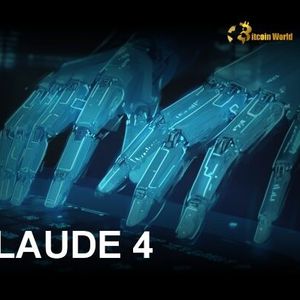Anthropic Claude 4 Models Unleash Advanced Reasoning
4 min read
BitcoinWorld Anthropic Claude 4 Models Unleash Advanced Reasoning The world of technology, closely watched by cryptocurrency enthusiasts for its disruptive potential, is buzzing with the latest advancements in artificial intelligence. Anthropic, a key player in the AI race, has just unveiled its new Anthropic Claude 4 family of AI models , promising significant leaps in capability, particularly in complex problem-solving and programming tasks. Unpacking Anthropic Claude 4: Opus and Sonnet Anthropic introduced two new models at its developer conference: Claude Opus 4 and Claude Sonnet 4. These models represent the cutting edge of the company’s efforts, aiming to set new industry standards. According to Anthropic, they excel at analyzing vast datasets, handling intricate, multi-step tasks, and performing complex actions. Here’s a quick look at the two models: Claude Opus 4: Positioned as the more powerful model, designed for highly complex tasks requiring deep analysis and multi-step reasoning. Access is primarily for paying users. Claude Sonnet 4: Intended as a versatile, high-performance model suitable for a wide range of applications, including serving free users of Anthropic’s chatbot apps. It also acts as an improved replacement for the previous Sonnet 3.7. Enhanced Reasoning Capabilities and Task Execution One of the headline features of the new Claude 4 models is their improved reasoning capabilities . Anthropic states that Opus 4 can maintain focus and coherence across numerous steps within a complex workflow. This is crucial for tackling tasks that require sequential logic and sustained analysis. The models also feature a ‘hybrid’ mode, allowing for both near-instant responses for simple queries and extended ‘thinking’ time for deeper reasoning. When in reasoning mode, the models can take longer to process and show a summary of their thought process, offering users insight into how the AI arrived at its answer. Furthermore, Claude 4 models can leverage multiple tools, such as search engines, in parallel and switch between reasoning and tool use to refine their outputs. They can also extract and retain facts in a form of ‘memory’, building ‘tacit knowledge’ over time to handle recurring tasks more reliably. Boosting Productivity with Advanced Coding AI Anthropic has specifically tuned both Opus 4 and Sonnet 4 to perform exceptionally well on programming tasks, making them powerful tools for writing and editing code. This focus on coding AI reflects the growing demand for AI assistants in software development. To support this, Anthropic is enhancing its Claude Code tool. Developers can now integrate Claude Code directly into popular Integrated Development Environments (IDEs) like Microsoft VS Code and JetBrains, and connect it with third-party applications using a new SDK. A GitHub connector allows the AI to assist with code reviews and error fixing. While AI-generated code can sometimes introduce vulnerabilities or errors due to limitations in understanding complex programming logic, the potential for significantly boosting developer productivity is driving rapid adoption. Anthropic is committed to frequent updates to continuously improve the coding capabilities of its models. Competitive Landscape and Business Ambitions The launch of Claude 4 comes as Anthropic seeks to substantially increase its revenue and maintain its position in the fiercely competitive generative AI market. Founded by former OpenAI researchers, Anthropic reportedly aims for significant earnings growth in the coming years, backed by substantial funding from investors like Amazon and Google. Rivals such as OpenAI and Google are also rapidly advancing their own models and developer tools. While Anthropic’s Opus 4 shows strong performance on specific benchmarks, like coding evaluations (SWE-bench Verified), the AI race is neck-and-neck, with competitors excelling in other areas like multimodal understanding. Pricing and Accessibility Access to the new models varies. Sonnet 4 will be available to both free and paying users of Anthropic’s chatbot apps. Opus 4, the more advanced model, will be exclusive to paying users. For developers accessing the models via API (through platforms like Amazon’s Bedrock and Google’s Vertex AI), the pricing is token-based: Opus 4: $15 per million input tokens / $75 per million output tokens Sonnet 4: $3 per million input tokens / $15 per million output tokens A million tokens is roughly equivalent to 750,000 words, providing a large context window for complex tasks. Safety and Responsible Development Anthropic is releasing Claude 4 with enhanced safeguards, including stronger harmful content detectors. The company is acutely aware of the potential risks associated with highly capable AI models, noting in internal testing that Opus 4 could potentially increase the ability of individuals with STEM backgrounds to develop dangerous materials (reaching their ‘ASL-3’ specification). This highlights the ongoing challenge and responsibility in developing and deploying frontier AI. Conclusion Anthropic’s new Claude 4 models, Opus 4 and Sonnet 4, represent a significant step forward in AI capabilities, particularly in complex reasoning and coding. With enhanced task execution, tool use, and memory features, alongside improved coding tools, Anthropic is pushing the boundaries of what generative AI can achieve. While the competitive landscape remains intense, these models underscore Anthropic’s commitment to advancing AI performance and accessibility, albeit with careful consideration for safety. To learn more about the latest AI news trends, explore our articles on key developments shaping AI models and features. This post Anthropic Claude 4 Models Unleash Advanced Reasoning first appeared on BitcoinWorld and is written by Editorial Team

Source: Bitcoin World



